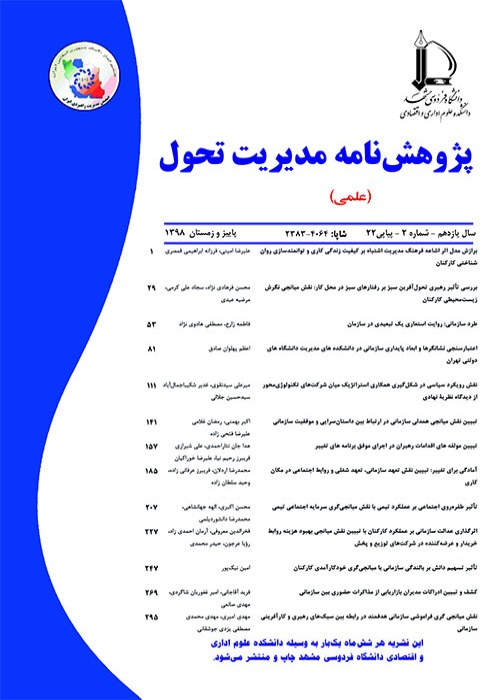The Impact of Cultural Intelligence and Organizational Intelligence on Organizational Agility
Case Study: Social Security Organization of Fars Province
Author(s):
Article Type:
Research/Original Article (دارای رتبه معتبر)
Abstract:
Introduction
Organizations are faced with a variety of changes as they have to operate in a dynamic, changing, and ambiguous environment. Therefore, they have no choice but accepting such changes because of the pressure they impose on organizations. Besides, organizations are not able to survive unless they accept changes and adapt themselves to internal and external changes. The ability to respond to changes is called agility. In fact, agility can be defined as the ability to adapt changes and effective use of the opportunities that are caused by such changes. However, it should be noted that today's organizations face challenges that somehow affect their ability to respond and adapt with changes. Despite the fact that today's organizations are faced with challenges, the focus on organizational intelligence for enhancing performance and growth is a necessary step. Organizational intelligence is the intellectual ability of the organization to solve organizational problems and emphasize the combination of human and its technical capabilities to solve problems. In addition, due to the cultural diversity within organizations, there is a wide range of emotions, so that differences in language, ethnicity, politics, and many other characteristics can emerge as potential conflictual resources, and if there is a sound understanding of the situation and the availability of cultural intelligence, organizational performance and adaptability will improve through changes.
Theoretical Framework:Several definitions of organizational agility have been presented. The term agile refers to the speed and responsiveness of an organization when faced with internal and external events, successful identification of the basics of competition, and taking appropriate actions in a knowledge-based environment with rapid changes. Agility is a focus on interests, and can be defined as the ability to touch the long-term changes that utilize the power of innovation and innovation in the organization. Agile organizations are ready to learn and can optimize their performance through optimal use of opportunities. Cultural intelligence is the ability to grow through continuous learning and the sound understanding of cultural variations, values, and understanding of human beings in the context of culture and their behavioral differences. The concept of cultural intelligence was first introduced by Barley and Ang (2003) who defined cultural intelligence as the ability to learn new patterns in cultural interactions and to provide correct answers to these patterns. They presented it as an individual ability to understand, interpret, and act effectively in situations with cultural diversity. Organizational intelligence is a new concept in the organization and management literature, which was proposed by Karl Albrecht (2002). In defining organizational intelligence, Albrecht writes: “Organizational intelligence is the talent and capacity of an organization to move the mental capability of the organization and focus on this ability to achieve the mission of the organization.
Methodology
The present study is an applied research in terms of its purpose and is descriptive-survey in terms of its nature and method. It is also considered as a quantitative research with regard to the type of data used. The research population included 202 employees working in the Social Security Organization of Fars province, from which 115 employees were selected through simple random sampling as the respondents in the research sample. The instrument used to collect data were Albrecht’s (2002) Organizational Intelligence Questionnaire, Cultural Intelligence Questionnaire (Ang, Van Dyne, Klaus & Koh, 2004), and Goldman and Nagel’s (1991) Organizational Agility Questionnaire.
Discussion and Conclusion:
The main objective of this study was to review the theoretical foundations of organizational intelligence and cultural intelligence as multidimensional constructs and their relationship with organizational agility in the Social Security Organization of Fars province. The results showed cultural intelligence and organizational intelligence are correlated with organizational agility, in the way that all components of cultural intelligence and organizational intelligence, with the exception of performance pressure (as a component of organizational intelligence), were found to be associated with organizational agility. In addition, metacognitive aspect of cultural intelligence was found to have a weaker correlation with organizational agility. The conceptual model has been discussed in two cases of significant numbers and standard estimate. Findings also showed that the conceptual model is an acceptable fit model. Therefore, it can be concluded that managers of the organization through paying attention to components of organizational intelligence and cultural intelligence can help organizational agility growth.Considering the role of organizational agility in creating competitive advantage for organizations, the following suggestions are offered: Fostering the spirit of change among employees and making optimal use of environmental opportunities resulting from changes.
If the cultural diversity is not properly managed among employees, it can lead to conflicts and inconsistencies in the organization. Therefore, paying attention to cultural intelligence as an individual ability to understand, interpret and act effectively in situations of cultural diversity can be an effective measure in this regard.
Language:
Persian
Published:
Transformation Managemet Journal, Volume:9 Issue: 2, 2018
Pages:
47 to 65
magiran.com/p1907214
دانلود و مطالعه متن این مقاله با یکی از روشهای زیر امکان پذیر است:
اشتراک شخصی
با عضویت و پرداخت آنلاین حق اشتراک یکساله به مبلغ 1,390,000ريال میتوانید 70 عنوان مطلب دانلود کنید!
اشتراک سازمانی
به کتابخانه دانشگاه یا محل کار خود پیشنهاد کنید تا اشتراک سازمانی این پایگاه را برای دسترسی نامحدود همه کاربران به متن مطالب تهیه نمایند!
توجه!
- حق عضویت دریافتی صرف حمایت از نشریات عضو و نگهداری، تکمیل و توسعه مگیران میشود.
- پرداخت حق اشتراک و دانلود مقالات اجازه بازنشر آن در سایر رسانههای چاپی و دیجیتال را به کاربر نمیدهد.
In order to view content subscription is required
Personal subscription
Subscribe magiran.com for 70 € euros via PayPal and download 70 articles during a year.
Organization subscription
Please contact us to subscribe your university or library for unlimited access!


